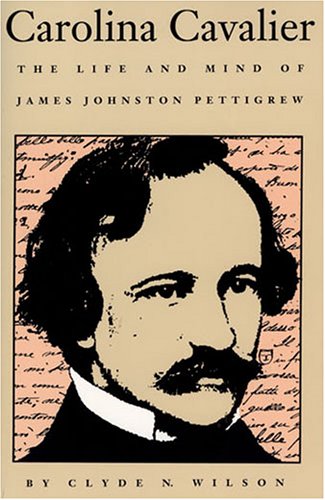For those who know it, the Huguenot-derived name “Pettigrew” immediately evokes the associated word, “Gettysburg.” Brig. Gen. Johnston Pettigrew was prominent on the first day of that battle, as the commander of Pettigrew’s Brigade, and on the third day, as the commander of Heth’s Division, which included his brigade. Pickett’s Charge might as well have been called Pettigrew’s Charge, or, as Clyde Wilson suggests, “Longstreet’s Assault.” But as it is, there is still no Gettysburg without Pettigrew. Not long after that Fourth of July that coincided with the fall of Vicksburg and Pettigrew’s own birthday, the Army of Northern Virginia was without Pettigrew. He was killed in the chaos of a rear-guard action at Falling Waters, and his loss was much lamented, for it seems that everyone knew his quality.
Pettigrew’s Civil War career was not consonant with his ability, and that was almost certainly a matter of luck. He was active in organizing the defense of Charles-ton before the Fort Sumter crisis but played no great role in the thing itself. He was wounded and captured at Seven Pines or Fair Oaks Station, the beginning of the Seven Days. Exchanged, he served under D.H. Hill in the abortive action at New Bern and at the affair at Blount’s Creek. Clyde Wilson has not written for us the story of a Confederate brigadier, however, but an account of a mind and sensibility that could not be completely expressed in the Civil War.
Johnston Pettigrew grew up as the scion of a distinguished and landed family in North Carolina. He excelled at school and at the university at Chapel Hill. He was soon surveying stars for Matthew Fontaine Maury at the National Observatory. But what was Pettigrew to do as his lifetime calling? Though Pettigrew eventually did much legal work in Charleston, Wilson has shown how his energy and sensitivity were focused by his travels in Europe. Unusually mature for his age and exceptionally responsive to the various environments, Pettigrew’s two trips to Europe were the high points of his life. His mind and imagination were excited to a remarkable degree by his encounters with others, and, as always with him, there was a gap between his emotional and intellectual responses. Pettigrew was later to declare that he wished as his lifework to write a history of the Moors in Spain. He did not live to do it, but his serious intent speaks volumes about his imagination, his historical sense, and his ability to think past the provinciality that is often the lot even of intelligent people.
Pettigrew did not write of medieval Spain, but he did write a book, in the spring of 1861, about Spain, his travels there, and his reflections. He had the ability to see past the surface into the depths of culture and character. Though a man of his age and place, he could and did respond to Spain as a 19th-century romantic with a pronounced streak of intellect. He loved the Spanish dignity and passion, the hierarchical sense, the manners of the don and the doña. And he was quite explicit about the political affinities he sensed between the American and European Souths. As he wrote on entering Spain for the second time,
Adieu to a civilization which reduces men to machines, which sacrifices half that is stalwart and individual in humanity to the false glitter of centralization, and to the luxurious enjoyments of a manufacturing, money age!
On his first trip to Europe, Pettigrew had learned that he could not enjoy the values of the English and the northern Germans. He instinctively was pulled to the south, where he became as besotted by Italy as many another has been. But then there was Spain, for which he felt a high degree of knowing identification. For a man of his background and cultural assumptions, his ease in relating to another world was remarkable, and so was his mastery of languages. Pettigrew was not unique in that regard, however, for the story of American attraction to the repudiated continent is old and varied. Even so, his degree of self-consciousness, his sense of himself as a Southerner, and his sense of himself and his heritage in historical perspective are notable achievements by a man of many talents. Pettigrew’s sensibility is oddly modern in its development. He seems to have arrived at something like Henry Adams’ position 40 years before that South-despising ironist did. And therefore, Wilson’s life of Pettigrew is much more than a military tale. Rather, it is a valuable contribution to American intellectual history.
As Professor Wilson has said of Pettigrew’s work at the very beginning of the Civil War,
Still, strangely, the zeal with which Pettigrew immersed himself in his pressing tasks did not at all preclude his customary ironic detachment, the hallmark of a good mind able to rise above its immediate circumstances.
Just so. The fact that this particular cavalier, lawyer, scholar, and scientist wore gray and was glad to do so says much about his own age, but also something about ours. Clyde Wilson’s elegant performance is addressed not only to the shade of Johnston Pettigrew and the world that died not long after he did but to the consequence of that collapse and the continuing cultural calamity. Carolina Cavalier is an antidote for, or a rebuttal to, the contemporary propaganda that suffuses the airwaves and clots the presses. It is the best historical work I have seen in a long time and an invaluable statement about the Civil War, its meaning and character, its causes and issues, and its abiding significance. I missed this book upon the occasion of its first publication but can now only feel that I was lucky in that mischance. I have had the serendipitous pleasure of a delayed first reading, and, in that glow, I think I will be far from alone.
[Carolina Cavalier: The Life and Mind of James Johnston Pettigrew, by Clyde Wilson (Rockford, Illinois: Chronicles Press) 303 pp., $24.95]

Leave a Reply